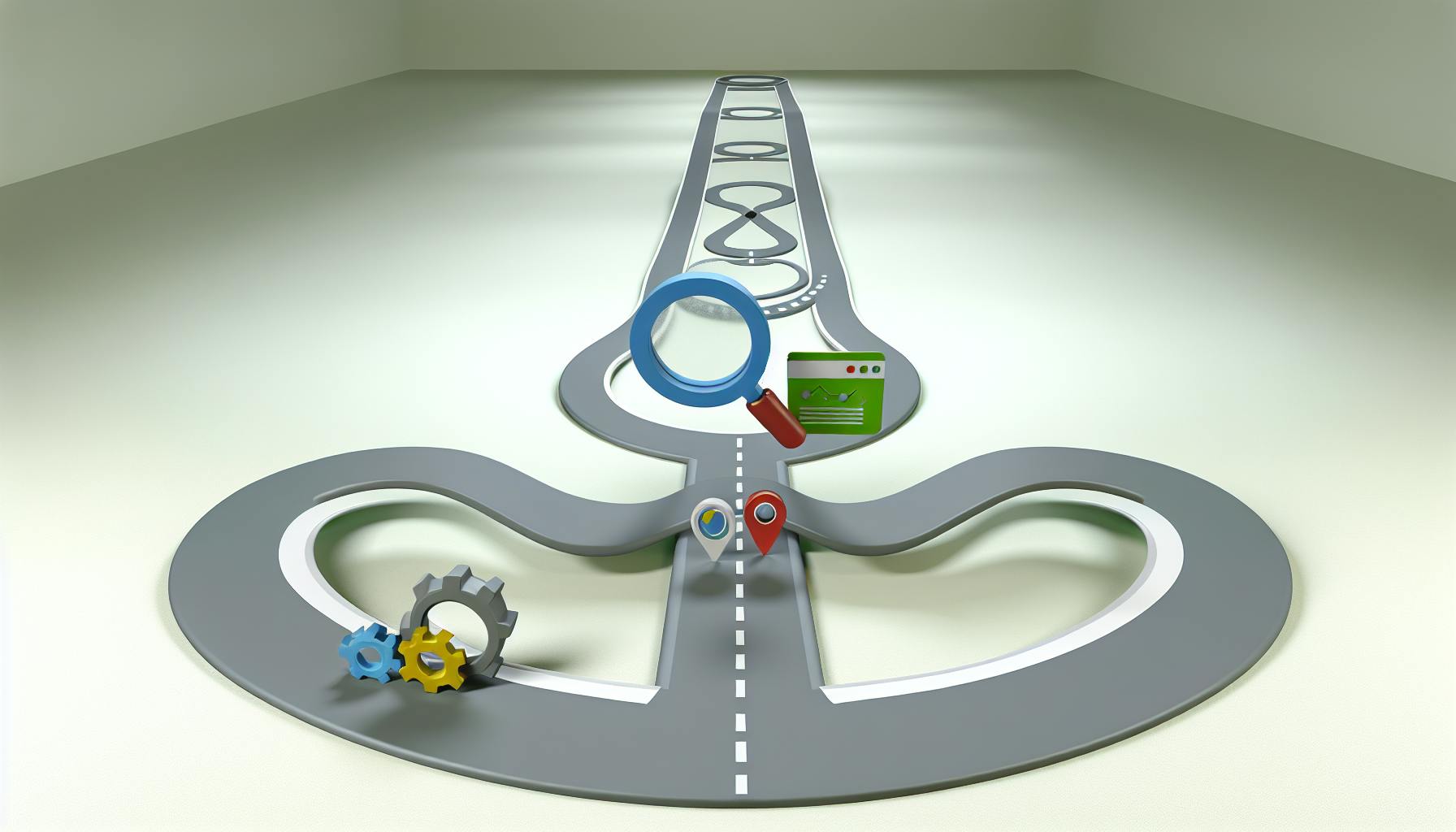The debate between using WWW or non-WWW URLs for your website does not significantly impact SEO directly. However, consistency is crucial to avoid duplicate content issues that can negatively affect your search rankings.
Key Considerations:
- Choose one version (WWW or non-WWW) and stick to it
- Set up 301 redirects from the non-preferred to the preferred version
- Ensure all internal links use the preferred URL structure
- Update your Google Search Console settings to reflect the preferred version
Quick Comparison:
| Feature | WWW URLs | Non-WWW URLs |
|---|---|---|
| Cookie Management | Flexible, subdomain-specific | Limited to root domain |
| CDN Integration | Easier with subdomain | More complex without subdomain |
| Branding | Traditional | Modern and sleek |
| URL Length | Longer due to subdomain prefix | Shorter and more concise |
| SEO Impact | No direct impact, but affects redirects and canonicalization | No direct impact, but affects redirects and canonicalization |
| User Experience | May be perceived as more professional | May be perceived as more modern and concise |
| Technical Requirements | May require additional server configurations | May require additional DNS configurations |
The choice between WWW and non-WWW URLs should be based on your website's specific needs and goals, rather than focusing solely on SEO implications.
Pros and Cons of WWW URLs
Benefits of WWW URLs
WWW URLs offer some advantages:
| Benefit | Description |
|---|---|
| Flexibility in DNS management | Easier to set up Content Delivery Networks (CDNs) and manage cookie restrictions |
| Familiarity and trust | Users are accustomed to the "www" prefix, which can enhance professionalism and credibility |
WWW URLs provide more control over subdomains, making it easier to manage DNS records and web server configurations. This can result in improved website security and performance.
Drawbacks of WWW URLs
However, WWW URLs also have some drawbacks:
| Drawback | Description |
|---|---|
| Longer URL structure | Can be less appealing and harder to remember for users |
| Perceived as outdated | Many modern websites opt for non-WWW domains |
| Canonicalization and redirects required | Can add complexity to website management and require additional configuration and maintenance |
Overall, the decision to use a WWW URL depends on a website's specific needs and goals. While WWW URLs offer flexibility and control, they may not be the best choice for websites that prioritize simplicity and modernity.
Pros and Cons of Non-WWW URLs
Benefits of Non-WWW URLs
Non-WWW URLs have several advantages:
| Benefit | Description |
|---|---|
| Shorter domain names | Easier to remember and type, making it more user-friendly |
| Bandwidth savings | Reduces the amount of data transferred, resulting in faster page loads |
| Suitable for smaller websites | Ideal for websites with limited resources or simple structures |
Non-WWW URLs are often preferred by modern websites due to their clean and concise appearance. They are also beneficial for smaller websites that don't require the added complexity of WWW URLs.
Drawbacks of Non-WWW URLs
However, Non-WWW URLs also have some limitations:
| Drawback | Description |
|---|---|
| CDN usage challenges | Can be more difficult to set up Content Delivery Networks (CDNs) |
| Cookie restrictions | Limited control over cookie management at the root domain level |
Non-WWW URLs can make it more challenging to manage DNS records and web server configurations, which can impact website security and performance. Additionally, they may not be suitable for websites that require advanced CDN setups or strict cookie restrictions.
SEO Impact of URL Structure
When it comes to search engine optimization (SEO), the choice between WWW and non-WWW URLs can significantly impact your website's performance. Here's what you need to know:
Search Engine Treatment
Search engines like Google treat WWW and non-WWW URLs as separate entities. This means that if your website is accessible via both WWW and non-WWW, Google will consider them as two different sites, leading to duplicate content issues. To avoid this, it's essential to choose one version and force a 301 redirect to that preferred version.
Duplicate Content Resolution
If you have both WWW and non-WWW versions of your website indexed, it can lead to duplicate content issues. This can negatively impact your website's ranking and authority. To resolve this, you can set up 301 redirects to the preferred version, ensuring that search engines recognize the canonical version of your website.
Consistency is Key
Consistency is crucial when it comes to URL structure. Choose one version and stick to it. If you decide to use WWW, ensure that all internal links and canonical URLs point to the WWW version. Similarly, if you opt for non-WWW, make sure all internal links and canonical URLs point to the non-WWW version.
Benefits of Consistency:
| Benefit | Description |
|---|---|
| Avoids duplicate content issues | Ensures search engines recognize a single canonical version |
| Improves website authority | Enhances overall SEO performance |
By maintaining consistency in your URL structure, you can avoid duplicate content issues, improve your website's authority, and enhance your overall SEO performance.
sbb-itb-60aa125
Choosing Your URL Structure
When selecting a URL structure for your website, consider several factors to ensure you make the right choice. In this section, we'll guide you through evaluating your website's needs, implementing your chosen URL structure, and maintaining consistency for long-term SEO benefits.
Evaluating Website Needs and SEO Goals
Before choosing a URL structure, assess your website's specific requirements and SEO objectives. Consider the following:
| Factor | Description |
|---|---|
| Technical requirements | Do you need to use subdomains or complex server configurations? |
| User experience | Do you prefer a clean, modern, and concise web address? |
| Familiarity and trust | Will a traditional www URL improve your website's credibility and trustworthiness among your target audience? |
By evaluating these factors, you can determine which URL structure best suits your website's needs and SEO goals.
Implementing Your URL Structure
Once you've chosen a URL structure, follow these technical steps:
1. Set up 301 redirects: Redirect all traffic from the non-preferred version to the preferred version of your website.
2. Update Google Search Console settings: Ensure that your preferred URL structure is reflected in your Google Search Console settings.
3. Manage canonical tags: Use canonical tags to specify the preferred version of your website and avoid duplicate content issues.
By following these steps, you can ensure a smooth transition to your chosen URL structure.
Maintaining Consistency
Consistency is crucial when it comes to URL structure. To maintain consistency, ensure that:
- All internal links point to the preferred version of your website.
- Canonical URLs are updated to reflect the preferred version.
- Sitemaps and communication channels use the preferred URL structure consistently.
By maintaining consistency, you can avoid duplicate content issues, improve your website's authority, and enhance your overall SEO performance.
Remember, choosing the right URL structure is just the first step. By evaluating your website's needs, implementing your chosen URL structure, and maintaining consistency, you can ensure long-term SEO benefits and improve your website's overall performance.
WWW vs. Non-WWW URLs: A Comparison
In this section, we'll summarize the pros and cons of WWW and non-WWW URLs in a comparison table format for quick reference.
Comparison Table
| Feature | WWW URLs | Non-WWW URLs |
|---|---|---|
| Cookie Management | Flexible, subdomain-specific | Limited to root domain |
| CDN Integration | Easier with subdomain | More complex without subdomain |
| Branding | Traditional | Modern and sleek |
| URL Length | Longer due to subdomain prefix | Shorter and more concise |
| SEO Impact | No direct impact, but affects redirects and canonicalization | No direct impact, but affects redirects and canonicalization |
| User Experience | May be perceived as more professional | May be perceived as more modern and concise |
| Technical Requirements | May require additional server configurations | May require additional DNS configurations |
This comparison table provides a concise overview of the key differences between WWW and non-WWW URLs, highlighting their advantages and disadvantages in various aspects. By considering these factors, you can make an informed decision about which URL structure best suits your website's needs and SEO goals.
Conclusion: Choosing Your SEO-Friendly URL Structure
In conclusion, the debate between WWW and non-WWW URLs may not have a significant impact on SEO, but it's crucial to make an informed decision based on your website's needs and goals. Consistency and correct implementation are key to avoiding duplicate content issues and ensuring a seamless user experience.
Key Points to Remember
- Consistency is key: Choose one version and stick to it to avoid duplicate content issues.
- Set up 301 redirects: Redirect all traffic from the non-preferred version to the preferred version of your website.
- Consider your website's needs: Think about technical requirements, branding, and user experience when deciding between WWW and non-WWW URLs.
- SEO implications: Remember that the choice between WWW and non-WWW URLs should be based on your specific needs and goals, rather than focusing solely on SEO implications.
By keeping these key points in mind, you can make an informed decision about your URL structure and ensure a solid foundation for your website's SEO and user experience.
| WWW vs. Non-WWW URLs | Key Considerations |
|---|---|
| Technical Requirements | Do you need to use subdomains or complex server configurations? |
| Branding | Do you prefer a traditional www URL or a modern, concise web address? |
| User Experience | Will a www URL improve your website's credibility and trustworthiness among your target audience? |
By evaluating these factors, you can determine which URL structure best suits your website's needs and SEO goals.
FAQs
Does removing www affect SEO?
Removing www from your URL does not directly impact your website's search engine optimization (SEO). However, it's crucial to ensure that you're not indexing both www and non-www versions of your site, as this can lead to duplicate content issues. If you prefer the non-www version, set up 301 redirects from the www version to the non-www version.
Should SEO include www?
The choice between using www or non-www URLs for SEO is not a significant factor. What's more important is consistency in your URL structure. Using www or non-www URLs won't affect your site's SEO, but using a www URL may have some technical benefits in a few areas. The key is to choose one version and stick to it to avoid any potential issues.
Comparison of WWW and Non-WWW URLs
| Feature | WWW URLs | Non-WWW URLs |
|---|---|---|
| Cookie Management | Flexible, subdomain-specific | Limited to root domain |
| CDN Integration | Easier with subdomain | More complex without subdomain |
| Branding | Traditional | Modern and sleek |
| URL Length | Longer due to subdomain prefix | Shorter and more concise |
| SEO Impact | No direct impact | No direct impact |
| User Experience | May be perceived as more professional | May be perceived as more modern and concise |
| Technical Requirements | May require additional server configurations | May require additional DNS configurations |
This comparison table provides a concise overview of the key differences between WWW and non-WWW URLs, highlighting their advantages and disadvantages in various aspects. By considering these factors, you can make an informed decision about which URL structure best suits your website's needs and SEO goals.


